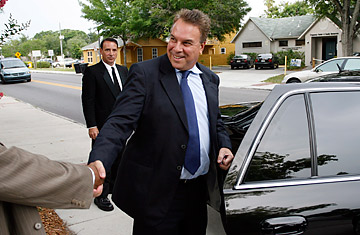
Jeff Greene, Democratic candidate for U.S. Senate, campaigns in St. Petersburg
To their critics, Rick Scott and Jeff Greene are poster boys for two of America's biggest problems: our health care and financial systems. Scott resigned in 1997 as CEO of the world's largest hospital corporation, Columbia/HCA, after the feds brought criminal and civil charges against it for massive Medicare fraud, resulting in a record $1.7 billion in fines and settlements. Greene — whose best man at his 2007 wedding was boxer and convicted rapist Mike Tyson, and who once had convicted Hollywood madam Heidi Fleiss as a housemate — became a billionaire using credit-default swaps to bet against the subprime mortgages that toppled the U.S. housing market.
Given voters' anger at Wall Street greed and general corporate malfeasance, you might think controversial résumés like those might dampen prospects for political careers. But then again, there's always Florida. There, according to a new Quinnipiac University poll, Scott looks set to win the Republican primary for governor on Aug. 24 and Greene is in a statistical tie with Congressman Kendrick Meek in the contest for the Democratic nod for the state's open U.S. Senate seat. In an interview with TIME, Greene calls that race "a choice between a career politician who's failed and an outsider who's succeeded — a guy like me."
Scott, who like Greene has never held elected office but is spending millions of his own dollars on TV ads, uses the same rhetoric in his race against Florida attorney general and former Congressman Bill McCollum — whom Scott leads by a surprising 13 points. But now that the two are surging in the polls — and in the wake of last week's primaries in California, where multimillionaire ex-CEOs Meg Whitman and Carly Fiorina won the GOP nominations for Governor and Senator, respectively — Scott and Greene are highlighting a critical issue in this election cycle: Are they the can-do antipoliticians that our rotted government culture needs, or are they just a troubling reminder that when an angry electorate throws open the door to outsiders, it's too often the ultra-rich who end up walking through it?
Greene, 55, whose personal fortune is estimated by Forbes magazine at $1.25 billion, was raised in a working-class family in Massachusetts and Florida. He worked his way through Harvard Business School before striking gold in real estate in California, where he ran unsuccessfully for Congress in 1980 as a Republican and acquired Tinseltown buddies like Tyson and Fleiss. "I don't condone some of the things Mike Tyson did in his past," says Greene, who acknowledges, "I've been a friend to people who may not have had perfect pasts." But perhaps his more controversial move was shoveling $50 million into credit-default swaps, arcane financial instruments that would pay off handsomely if the U.S. housing bubble burst, as Greene presciently feared it could. When it did, his investment turned into $800 million.
There was nothing illegal about how Greene made his fortune. He concedes explosive Wall Street tools like swaps and derivatives "need to be better regulated," but he argues he was just "protecting my real estate investments and the jobs they create" from "bad home loans Washington had allowed to run wild." Ironically, Greene says that's a big reason he's running: "In so many areas of our security, Washington is failing, and like a lot of people I'm in a panic that it's not getting anything done." But Meek accuses Greene of "betting against middle-class homeowners" and then, just two years after returning to Florida, "trying to buy" its Senate election in "carpetbagger" style. "Voters may be frustrated with Washington," notes Meek campaign manager Abe Dyk, "but they're even more frustrated with Wall Street."
